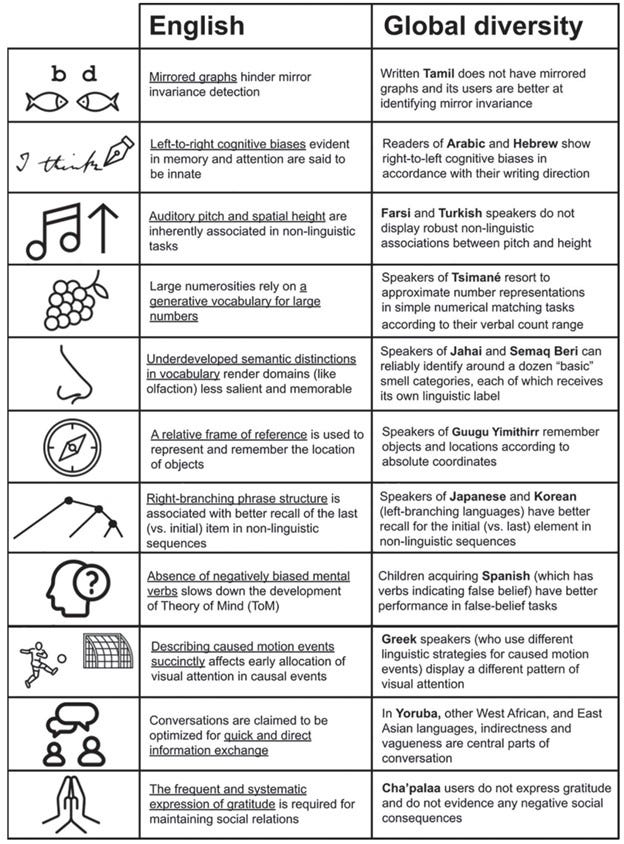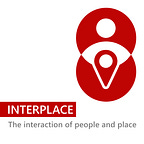Hello Interactors,
Happy 2023! Today we launch into a season on topics related to human behavior. So much of how we interact with people and place comes down to language. It shapes how we communicate with one another, but how much does language shape our behavior? And if one language dominates, how much does that domination shape our global society?
As interactors, you’re special individuals self-selected to be a part of an evolutionary journey. You’re also members of an attentive community so I welcome your participation.
Please leave your comments below or email me directly.
Now let’s go…
DO YOU SPEAK ENGLISH?
Last week I caught up with a friend of mine who left Microsoft soon after I did. He was a technology executive and is now pursuing a degree at Cambridge on ethics in artificial intelligence (AI). His coursework is very different from his engineering past and Taiwanese education. Fewer numbers, more words. He is reading multiple philosophy papers a week, sometimes 30 pages long. He must then write his own analytical essays. Predictably, these papers he is reading are written in English – his second language.
It can be challenging enough to read philosophy in a native language. When he encounters a word, he doesn’t understand, he often consults his Chinese dictionary to better understand the concept. But then when he compares that definition to the English dictionary definition, the meaning is sometimes different. The philosopher Ludwig Wittgenstein once wrote,
“Philosophy is a battle against the bewitchment of our intelligence by means of language.”1
For my bi-lingual friend for whom English is his second language, it seems the language is the battle against intelligence by means of the bewitchment of philosophy.
This is an increasingly common phenomenon around the world as English is the dominant language of higher education. An estimated one in six people on this planet speak some form of English.2 While seemingly small, it is the largest population to speak a common language in the history of our species. Still, with over 7000 different languages spoken around the world language diversity dominates.3
In the United States 80% of households speak English only at home.4 Those homes are likely to remain monolinguistic. But as immigrant populations in America grow and Indigenous languages resurface the number of bilingual or multilingual households is expected to increase. When the first wave of immigrants came to America in the late 1800s, many children were encouraged to drop their native language in favor of English. My American born Italian father-in-law was discouraged to speak Italian and thus never learned it. Meanwhile, the cost of learning English was too great for his mother, so she was discouraged to learn English. They never shared a richly common language.
Even though the United States has never declared English the official language, it is often assumed. As a result, there exists not only a monolingual bias, but an English bias. Given the last two global trotting colonizing superpowers have English as the dominant language, it follows the English language dominates. As a result, schools, including higher education replete with international bilingual diversity, is also dominated by the English language and all that comes with it. That includes the branches of the field of cognitive science intent on understanding how language affects how the brain works.
It was my father-in-law’s strict dad that insisted he speak English only. His attitude was ‘you’re an American, so you’re speaking English.’ It was common for immigrant parents during these times to attempt to erase their past in hopes of appearing more ‘American’. But this attitude may have been buoyed by a long-held belief there exists a cognitive cost of switching between two or more languages. A belief that was surely substantiated by the high cost of learning a second language proficiently. It seems advantageous to just pick one and stick with it. And for many of those early immigrant children in America, that choice would have been English.
But I’m reminded of another friend who grew up in Malaysia learning English and Malay while speaking her native cultural language and English at home. Malaysia’s population is a blend of Malay, Chinese, and Indian descendants, and the informal language, Manglish, blends words from English, Chinese, and Tamil. She is so comfortable jumping between these languages that when she and her sister talk, they sometimes use words from multiple languages in a single sentence. For her, there is no cognitive cost in switching. In fact, she may even benefit from using many languages at once.
YES, UH-HA, I AGREE
Some research in cognitive science points to a ‘bilingual advantage’. Multi-lingual speakers showed a greater “ability to plan, focus, and execute a wide array of tasks’ compared to single language speakers and the effect was pronounced among older adults.5 As a result, replicated studies show performance varies greatly depending on the task, age, language experience, and frequency of switching languages. Still, as cognitive research increases in parts of the world where bilingualism is more common, more is sure to be learned.
The bulk of knowledge in cognitive science comes from studying WEIRD people. They are predominantly White, Educated, Industrialized, Rich, and Democratic. The ‘E’ could just as well stand for ‘English-speaking’. The discipline is dominated by English-speaking researchers, studying a sliver of the English-speaking population, writing papers in English, and in countries that that are culturally Anglocentric. This flaw has been recognized for nearly a decade. But increasingly more research uses diverse sample populations, in more diverse locations, and is conducted by less Anglocentric researchers who use English as a second language.
In 2022, a group of scholars published a paper investigating how over-reliance on English may hinder cognitive science. It included a chart that illustrates a sampling of differences emerging from these more diverse studies. It shows how aspects of the written and spoken English language differ culturally, linguistically, and cognitively from certain other languages. For example, English speakers tend to frequently rely on words of gratitude to maintain healthy social relations. One study revealed English speakers were four times more likely to say ‘thank you’ than other languages.6 A language in Ecuador, Cha’palaa, doesn’t even have a word for ‘thank you’. Even ‘please’ is avoided without conflict. Thirsty? ‘Give me water’ is sufficient and considered polite.

Conversely, languages other than English tend to use words more frequently that promote and sustain social cohesion. One of the more extreme versions of this is Japanese where attention to social behavior is more closely monitored by all members of society. During conversation, the person whose ‘turn’ it is to speak is listening and looking for short affirmative confirmation, like ‘yes’, ‘uh-huh’, or head nods without losing their ‘turn’. Meanwhile the listener is listening and watching for breaks in phrasing to offer forms of affirmative confirmation.7 Linguists call this ‘back-channeling’ and can be found in cultures rich in social cohesion. Perhaps the English language and the American egocentric culture isn’t helping to heal our societal divisions.
The ordering of words in Japanese versus English has cognitive implications too. All languages have a linguistic ‘head’ that determines certain properties of a phrase. The Japanese language puts the head at the end of a phrase while English puts it at the beginning. This has implications for differences in working memory between Japanese and English speakers. When recalling a sequence of figures, like numbers, objects, plants, or animals, Japanese speakers have higher precision on the last item in the list and English speakers the first.8
Cognitive differences in ordering arrangements can extend beyond listed figures to spatial reasoning. For example, English speakers use their own relational viewpoint as a frame of reference when describing spatial locations, like ‘left’ or ‘right’. In contrast, certain native languages in Australia and Namibia use cardinal directions like ‘west’ or ‘east’. These differences in linguistic encoding are shown to influence learning of spatial configurations, search and find tasks, and tracking moving objects.9 Again, the apparent egocentrism of English speakers is seemingly creeping into even how we see ourselves in the world.
ADVERSITY TO DIVERSITY
The ’left-right’ bias shows up not only in space, but also time. English speakers typically think of a timeline as going from left to right. This ‘left-to-right’ bias can be attributed to many factors, including the ordering of words in a sentence or a math equation. Solving a math problem or writing a sentence in English involves ‘starting’ on the left and over time ‘ending’ up on the right. Those taught to read and write or do math in English or similar languages thus have a linguistic coding in the brain that associates the past with the ‘left’ and the future with the ‘right’.
But those who have not been exposed to these encodings have no such associations. And given there are 7000 languages spoken in the world, that accounts for a lot of humans. As more humans gain access to the internet, more and more of these languages and cultures will be exposed to the 1.2 billion internet users speaking English. The fastest growing languages online are Chinese (0.9 billion), Spanish (0.4 billion), and Arabic (0.2 billion).10 More people in America speak Spanish than all of Spain.
Given this growing linguistic diversity, these researchers conclude cognitive science is not doing nearly enough “to live up to its original mission of developing an interdisciplinary exploration of ‘the mind’”. They say English language dominance may be the field’s “original sin” and call for a commitment “to research that seeks to systematically explore, generalize, and falsify our models of human cognition by exploring non-English-speaking peoples and societies.”11
As we enter a new year, English speaking students, like my continuing adult education friend, will be returning to classes and campuses dominated by the English language. Others will be drawing that timeline planning the next quarter. Many spent this holiday season exchanging in culturally supported niceties perpetuated by language. Santa only delivered the presents if the child had been saying ‘please’ and ‘thank you’ all year. We will spend the next year looking to do the same as we all struggle to keep those new year’s resolutions.
The words ‘spent’ and ‘spend’ bring up another peculiarity of English – tenses. It turns out those living in countries using languages that don’t have an obligatory future tense like English may be better at keeping their resolutions. They tend to smoke less, practice safer sex, and are less obese. And, hey, tax time is also just around the corner in the United States. It turns out those not obliged to use future tense in their language also save more.12
But these researchers admit these studies deserve scrutiny. There is much debate about how culture and history shape language and how language shapes culture and history. Teasing out language from cognition and culture will continue to confound scholars, researchers, and practitioners. However, advances in neuroscience and brain imaging together with increased diversity of research subjects, locations, and researchers are sure to yield more practicable results. These tools didn’t exist at the onset of the study of language.
In 1863, the linguist Wilhelm von Humboldt, and brother of the more famous naturalist Alexander von Humboldt, wrote three volumes on comparative linguistics after studying the Kawi language of Java. He noted then there “resides in every language a characteristic worldview.” One day we may be able to discern just what elements of worldview cognition are common to all human brains – and the brains of other animals – regardless of language and culture.
Until then, this is all that is left to write for today. In English. While my sentences have flowed from left to right, the beginning is at the top and the end is here at the bottom. I wish to ‘thank you’ for reading or listening and invite you to ‘please’ click ‘like’ or leave a nice comment. If you feel so obliged. It’s been my ‘turn’ to speak, now it’s yours.
Wittgenstein's Language. A Lichtigfeld. 1975.
Over-reliance on English hinders cognitive science. Damián E. Blasi, Joseph Henrich, Evangelia Adamou, David Kemmerer, and Asifa Majid. Trends in Cognitive Sciences. 2022.
Ibid
Ibid
Ibid
Ibid
Ibid
Ibid
Ibid
Ibid
Ibid
Ibid












